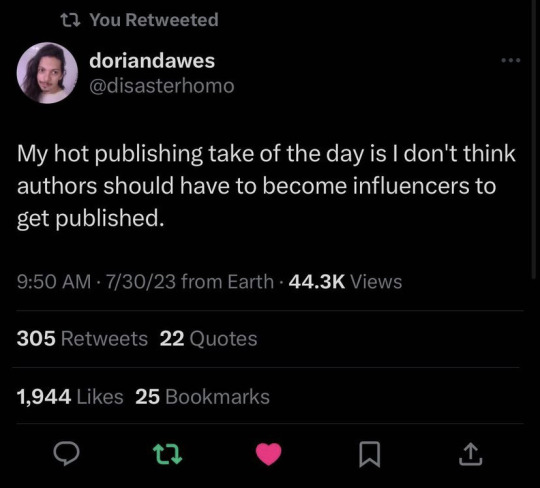#on publishing
Text
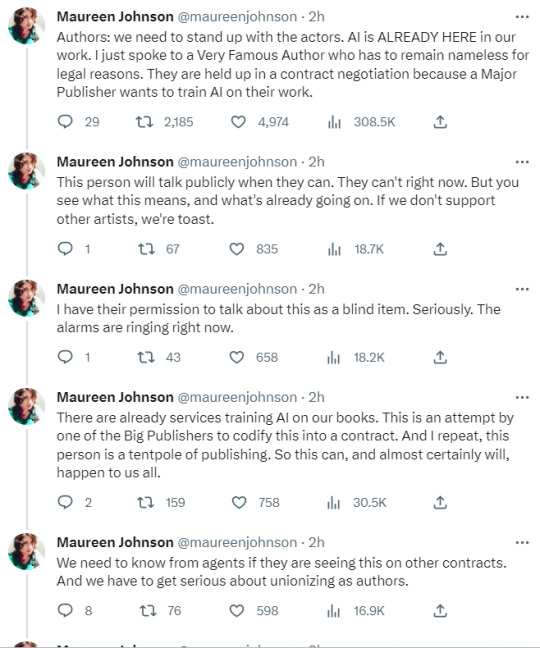
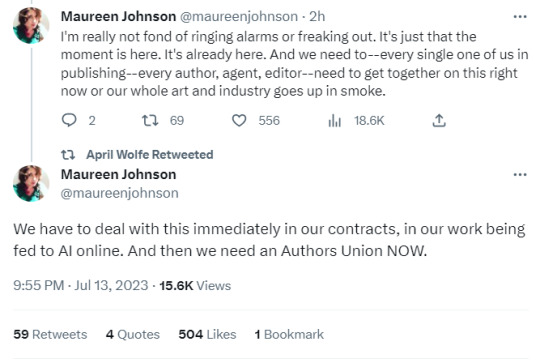
Alarm bells being rung by Maureen Johnson on AI and the Big Publishers
#I've already got academics wanting it put into their contracts that their work CAN'T be used to train AI#This is a scary time#ai MUST be regulated#on publishing#wga strike#sag aftra strike#sag-aftra strike#AUTHORS UNIONIZE
27K notes
·
View notes
Text
I got a printed version of my book, which is extremely exciting! But faced with the reality of the object, I'm in a bit of a dilemma. I know part of it is due to the formatting, but this sucker is huge—at 140k words, it clocks in at about 630 pages. For what I'm aiming to be a debut novel in an urban fantasy series, I know that's over budget as far as word count agents tend to like.
Which leaves me with a couple choices.
The first is to go through it and slash as much as possible. I've already been through the editing trenches with this one, for literally years at this point, so I don't know what I could possibly cut. I'd need outside help to guide me but professional editors are way out of my price range. As this is setting up a series, I don't want to cut what is important in terms of character and plot development, but I'm so close to the damn thing that I can't see the forest for the trees.
Another option is to go the radical route and attempt to split this into two, shorter, books. It would require a ton of restructuring and I would have to rethink arcs and climaxes. This would fit my genre better, as it tends to have short books but long series. The problem with this option is—and you'll never believe this—I've already done this. This version is the cut in half version! Which is insane! Why am I such an overwriter 😭
The last option I can think of is to leave it as-is (or tinker with it mildly) and send it out to agents. If they reject me for length, then I'll know that and have a better understanding of what they want. But if someone loves it, then I won't have to do any kind of radical surgery to it. The only thing I would lose at that point is time, which is not of concern to me, as I'm diligently working on the sequels.
If anyone has any advice, I'm completely open to ideas.
11 notes
·
View notes
Text
Celebrate Pride by Learning About Ten Queer Independent Publishers!
This week, we’re spotlighting other queer, independent presses out there – some queer-owned, some focusing on publishing queer stories, some both. Take a look below - and if you know another press that’s not on the list, add it in the reblogs! The more queer publishers, the better. :D

Brown Recluse Zine Distro is a collectively run organization created to support and center zines by queer and trans people of color. Check out their shop for zines on dozens of topics, from personal reflection to political organizing.

Zombies Need Brains has been publishing themed anthologies for 10 years, and, this summer, they’re expanding to publish two short stories per month through their Patreon. Their next anthology’s theme will be announced in July; in the meantime, you can also pick up their previous anthologies and other ebooks in their store.

Interlude Press and their YA imprint, Duet Books, have published more than 90 works of LGBTQ+ fiction across genres. Their catalog is full of award-winners, and with the plethora of genres, they offer something for everyone.

All Worlds Wayfarer, a quarterly speculative literary magazine, has recently started producing themed anthologies as well. Their latest, Prismatic Dreams, contains 30 sci-fi, fantasy, and horror short stories with queer protagonists

Speculatively Queer “publishes speculative stories about queer hope, joy, love, affirmation, and community.” It Gets Even Better: Stories About Queer Possibility is available now, and Xenocultivars: Stories of Queer Growth is available for preorder.

Renaissance Press publishes diverse Canadian voices across genres. Their latest release is AfriCANthology: Perspectives of Black Canadian Poets.

Microcosm Publishing is a Portland-based publisher founded in 1996 to focus “on … the experiences of what it is like to be a marginalized person.” They especially focus on publishing work by women. They’ve currently got a Kickstarter running for their next title, “Unf*ck Your Grief.”

OFIC Mag is a small, new press focused on publishing a quarterly anthology featuring original stories and art by fanauthors and fanartists. They recently opened their third edition to submissions.
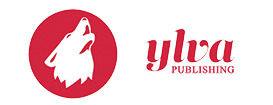
Ylva Publishing focusing on stories about women loving women, with an emphasis on diversity. They’re woman-owned and cross-genre, releasing everything from mysteries to romance to historical to erotica. They also publish YA titles!
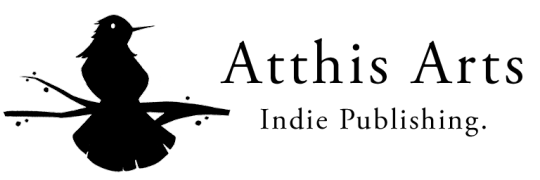
Atthis Arts Indie Publishing is a small press named after a character from Sappho's poetry. They are especially interested in publishing works by members of underrepresented groups.
Bonus! An 11th Press
Space Wizard Science Fantasy, an indie press focused on queer sci-fi and fantasy, is just getting started. They've launched a Year 1 Kickstarter, featuring a number of titles they are working on, and they could really use more support. Back their current Kickstarter to purchase individual books or subscribe to the whole Year 1 slate of fiction!
#resources#on publishing#queer publishing#guest blogger#guest blogger adrian harley#original content#queer fiction
327 notes
·
View notes
Note
Can I ask, how does one go about becoming an editor? Like, where do you apply for jobs?? What kinda training do you do?? Are there companies that hire out editors to writers? Im just so confused about it. Ive always been interested in editing, and am considering doing it as a job
Editing is a weird career.
Really, I started as a writer. Like, when I was eleven. In jr. high and high school, I was in a writing critique group and I wrote a lot. I graduated from university with a degree in theatre, film, and creative writing. I was often the person my friends came to when they needed help with a paper (or the correct placement of a semicolon). I've been involved in fandom since I was about 17, and I was very fortunate to fall in with a group of excellent writers who were also excellent betas and editors. I learned a TON from them without realizing how much I was learning.
I started editing by accident, really. Sometimes, that's how it happens. I mostly got gigs here and there through friends or word of mouth. About ten years ago, I got more serious about it. I worked for companies that paid horribly. Then I did an editing test for a company that paid less horribly, and they hired me. After a couple of years editing countless academic papers, ESL academic papers, novels, emails, business documents, etc., I decided to branch out on my own (mostly so I could work on more fiction; I was burned out on academic papers).
I joined Editors Canada, started volunteering with them, got a lot more experience, and took a few continuing ed courses to gauge where my skills were at and to determine if I needed to upgrade my education. I decided I didn't need to do that, because I already knew the things I was being taught.
I read a lot of books on editing, writing, and craft. I familiarized myself with the Chicago Manual of Style, APA, MLA, and a couple of other style guides. I learned the differences in spelling, punctuation, and style between US, UK, and Canadian English. I went to webinars, conferences, and courses (all the major editing associations offer these, usually cheaper or free for members; they are a great way to determine what kinds of editing you actually LIKE). I learned the difference between rules and preferences, and when to apply them to a text.
I work freelance, which means I have my own business as a sole proprietor. I'm a contractor with a couple of companies who sometimes send work my way, but most of my clients are individual writers planning to either self-publish or polish their work before seeking traditional publication via the agent/tradpub route.
Freelancing has many perks but is not particularly secure. Especially if you're American and need an employer to provide health insurance, or if you're single and don't have another income to lean on when contracts are scarce. These days, most of my work comes via referrals, my website, or the listing I have in the Editors Canada directory. I follow a couple of editing-related Facebook groups; I've learned a lot there, and I've also picked up the occasional client. A couple of people have found me through LinkedIn. A couple of people have found me through here!
I've never worked in-house for a publisher--mostly because having control over how many hours I work and when I work them is my top priority. In-house is a whole different ballgame; I know a bit about it from my peers, but I don't have firsthand experience to pass on. These jobs are supposedly more secure--and they tend to be salaried, with benefits, etc.
"Editing" is a GIANT umbrella term. There are SO many types of editing out there. People tend to think of book publishing first, but that's only one avenue. There are also different kinds of editors who tackle different types of problems. I've done enough of everything to recognize that I am much happier when I'm working on big picture stuff--coaching, developmental editing, manuscript critique. Others specialize in the nitty gritty mechanical details that make proofreading or copy editing a better fit.
Right now, the bulk of my work life is actually spent ghostwriting. The client's business-materials editor posted that his client was looking for someone to help with characterization in a novel. I ended up winning that contract. He came to me with one monster book. I helped him realize it needed to be at least a trilogy, and now he has plans for a ten-book series--and I'm helping write it. But I got the job because of the work I've done on the development side of editing--and because I've spent SO MUCH TIME learning about characterization (via acting, fandom/writing fanfic, reading, etc.). So. It all feeds into the same place.
The tl;dr is that my experience has been a bizarre mix of being in the right place at the right time, ongoing professional development, and learning the value of volunteering with an association. If I were starting down this career path right now, I'd probably do an editing certificate (there are many out there, depending on country). I'd definitely join an association sooner (even as a student member) and volunteer.
Actually, the ultimate tl;dr is ... this industry IS CONFUSING. So, don't feel bad about being confused. It's actually probably about eight different kinds of job wearing a trench-coat and pretending it's something called "Editing."
27 notes
·
View notes
Note
How did you know you wanted to become an author? Coming from someone who enjoys creative writing, but not literary analysis, any tips/advice for someone who thinks they might like to become an author? Out of curiosity, feel free to ignore.
So! I didn't know I wanted to be come an author. I didn't study creative writing. I went to university and got my Bachelor's degree in Theatre Design & Technology with an emphasis in Lighting Design.
I sort of became an author by...accident? After getting my degree in theatre I was having trouble finding jobs (for ever play there might be twenty actors but only one lighting designer), plus I was young and the Lord of the Rings films had just come out and I thought "Maybe I should make movies instead of theater..." So then I did a year of film school. And turns out that wasn't really for me either, but I did like my screenwriting class!
So even after moving back home during the Great Recession I kept writing screenplays, thinking one day I could get one produced. But turns out it's way easier if you either know people or are independently wealthy, so none of my screenplays went anywhere. But then I thought: what if I tried turning a screenplay into a book? Maybe you don't have to know people to write books!
So I wrote a book...I wrote a lot of books. Each book my craft grew. Eventually I wrote one I thought might be good enough to publish. Turns out it wasn't! But I kept writing anyway. At that point I had a stable job that had a lot of inactive desk time, so I did a lot of writing then, or at night, or in the morning. I think it had become something of a challenge for me to see if I could do it? So I eventually wrote Darius and that one DID get published. And I kept my dayjob! I wasn't sure I could make this thing work long term. But then the pandemic happened and it turns out writing was the MORE stable career in the mild apocalypse.
All of which to say: I had multiple careers before being an author. And only now, five years in, am I feeling mostly confident that this is my new path. So give yourself the grace to try lots of things, and know that there is ALWAYS time to forge a new path for yourself.
Now, for advice:
#1: Read! If you're serious about publishing books, read books that are being published right now. Read to grow your craft. Read to know what's in the market. Read to know what you like and what you don't like. Read to be in conversation with the people you hope will be your peers.
#2: Write. Figure out what a writing "routine" looks like for you. Daily writing? Intermittent bursts of hyperfocused drafting? Weekends at a coffee shop? We all have different artistic needs. Figure out yours. Try lots of things and see what sticks.
#3: Live. Life is the best source of things to write about! Go to museums. Walk through parks. Look at the night sky. Listen to music. Fall in love and out of love. Go to therapy. (Therapy is GREAT for finding new things to write about lol.)
#4: Research. This is for if you decide you want to pursue publishing professionally. Learn about the differences between traditional and independent (ie self) publishing. Learn about agents and publishers and how the business works. Arm yourself with knowledge. Remember, even if it's a dream, it's ALSO a business—and as such, there will always be people trying to exploit you for capital.
I guess that's it for now. I might add to if it I think of more things later. Thanks for the great ask! And sorry for the life story.
35 notes
·
View notes
Text
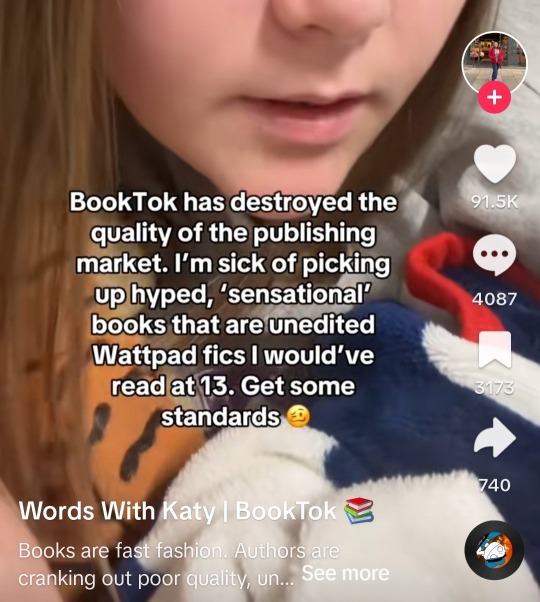
AND THEY’RE FUCKING CORRECT
41K notes
·
View notes
Text
This is a friendly reminder to never, ever publish your book with a publishing company that charges you to publish with them. That is a vanity press, which makes money by preying on authors. They charge you for editing, formatting, cover art, and more. With most of these companies, you will never seen a cent of any royalties made from sale of your book. A legitimate publishing company only makes money when you make money, they will never charge you to publish with them. If a company approaches you and says "Hey, we'll publish your book, just pay us X amount of money," tell them to go fuck themself and block them.
49K notes
·
View notes
Note
it's weird to be attracted to an ugly frog like wtf is even your taste in men
i won't argue with you about whether or not fawful is ugly but it is weird yes, i agree
i have long accepted that i am weird
#i'm sorry i had to publish this one bc it's worded so funny#thanks for giving me another ask to add to my funny anon asks folder on my desktop#asks
44K notes
·
View notes
Text
it's so beethover / we're so bach
#POST#play my friends' rpgmaker game it's cool and fun and they've gotten published in two magazines for it#pp
26K notes
·
View notes
Note
Random question, but is there a hard and fast rule about how much of a song lyric can be used in a published work before it has to be licensed/attributed/whatever the correct wording for it is? Or how different it has to be from the original if it's paraphrased and the rights to use the original are not being purchased? Are there different rules for academic and non-academic publishing?
Thanks for the question!
The rules for song lyrics are pretty much same for academic and non-academic publishing alike; even one whole line needs permission. The issue with songs or poems is that, compared to quoting from an academic text or a novel, they're incredibly short and so there's more concentrated copyright to be infringed upon (unless it's an excessively long epic poem, and even then). I've never come across this myself, but you could potentially reference one or two words in a lyric without permission, just not the whole lyric, and instead describe what the rest of it says.
As for paraphrasing lyrics, one of my favourite examples is from Neil Gaiman's Anansi Boys:

12 notes
·
View notes
Text
To better celebrate my accomplishments, which is a new years' resolution for me, I decided to print out a professional-as-I-can-make-it draft of my first book, of a series I've been working on (and I'm astounded to say) since late 2017.
I used lulu for printing, which had a great interface and clear directions, and canva to make a cover image (since I have no skills and this is just for myself). The book clocks in at 140k and after formatting to a 6x9 hardcover it sits at 632 pages. Which. Wow. Picking up a book at hand that matches that size, it's about the same length as ACOMAF.
I should get it in 2-3 weeks. I'm so excited to hold it in my hands. I won't be querying for a while, as I want to get more done in the series—I've already written a few drafts of book two and an early but complete draft of three, which will unfortunately change pretty drastically but we are chugging along (my goal is to spend half of 2024 working on book 2 and half on book 3)—so this would be the version I query to agents when the time comes.
But the best part is, after sending it off, I got an email from the website saying "Congratulations on publishing your book!"
And that felt pretty damn good.
7 notes
·
View notes
Text
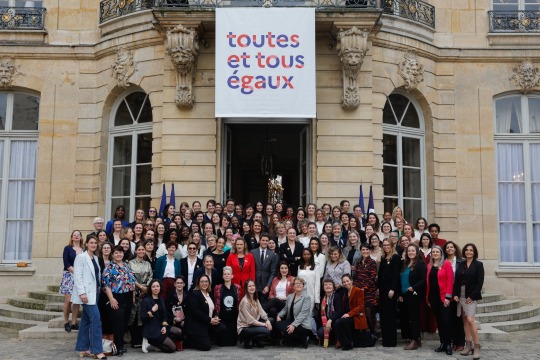
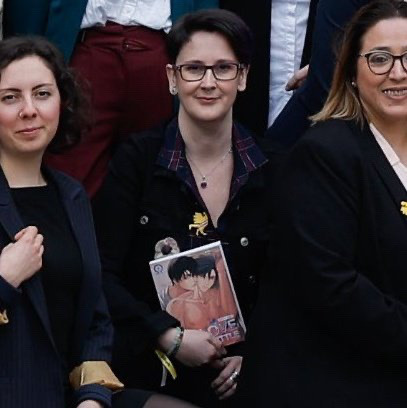




liberté, egalité, fraternité et yaoi
#love shuttle……. it’s the millennium of omegaverse#a win for fujoshi everywhere#had to look her up and that’s noemie the founder of nao studio publishing#also calling it bl is putting it so delicately#this is full on squelchy invisidick yaoi#anyway if you’re looking for shamelessly id-fulfilling manhwa this is it#it’s love shuttle by aeju#man who has never gone into heat his entire life and insists he is FINE with it#suddenly spontaneously keeps slipping into heat every time a certain alpha is around#and then they fuck nasty in almost every chapter#love shuttle#omegaverse#manga#manhwa#twitter#yaoi#art
9K notes
·
View notes
Text
I'm imagining if tolkien lived now and publishers were asking him if he had enough followers on twitter and if he could film videos to market his found family elfcore magic cottagevibes worldbuilding fantasy book on tiktok. i think he would run them over with his car actually
#literally what is the point of a publisher then if they aren't going to sell the book.........#mp#tolkien#jrrt
23K notes
·
View notes
Text
Fanfiction Authors: HEADS UP
(Non-authors, please RB to signal boost to your author friends!)
An astute reader informed me this morning that one of my fics (Children of the Future Age) had been pirated and was being sold as a novel on Amazon:
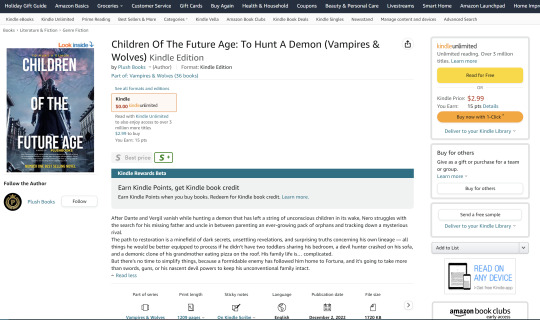
(And they weren't even creative with their cover design. If you're going to pirate something that I spent a full year of my life writing, at least give me a pretty screenshot to brag about later. Seriously.)
I promptly filed a DMCA complaint to have it removed, but I checked out the company that put it up -- Plush Books -- and it looks like A LOT of their books are pirated fic. They are by no means the only ones doing this, either -- the fact that """publishers""" can download stories from AO3 in ebook format and then reupload them to Amazon in just a few clicks makes fic piracy a common problem. There are a whole host of reasons why letting this continue is bad -- including actual legal risk to fanfiction archives -- but basically:
IF YOU ARE A FANFIC AUTHOR WITH LONG AND/OR POPULAR WORKS, PLEASE CHECK AMAZON TO SEE IF YOUR STORIES HAVE BEEN PIRATED.
You can search for your fics by title, or by text from the description (which is often just copied wholesale from AO3 as well). If you find that someone has stolen your work and is selling it as their own, you can lodge a DMCA complaint (Amazon.com/USA site; other countries have different systems). If you haven't done this before, it's easy! Here's a tutorial:
HOW TO FILE A COPYRIGHT COMPLAINT FOR STOLEN WORK ON AMAZON.COM:
First, go to this form. You'll need to be signed into your Amazon account.
Select the radio buttons/dropdown options (shown below) to indicate that you are the legal Rights Owner, you have a copyright concern, and it is about a pirated product.
Enter the name of your story in the Name of Brand field.
In the Link to the Copyrighted Work box, enter a link to the story on AO3 or whatever site your work is posted on.
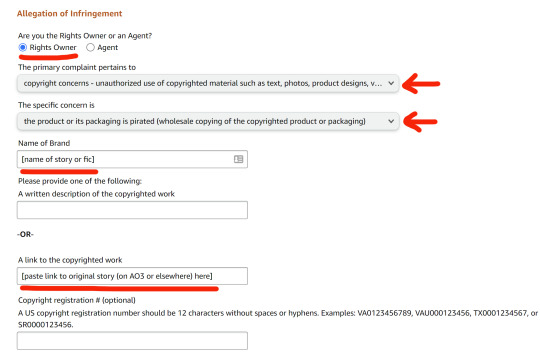
In the Additional Information box, explain that you are the author of the work and it is being sold without your permission. That's all you really need. If you want, you can include additional information that might be helpful in establishing the validity of your claim, but you don't have to go into great detail. You can simply write something like this:
I am the author of this work, which is being sold by [publisher] without my permission. I originally published this story in [date/year] on [name of site], and have provided a link to the original above. On request, I can provide documentation proving that I am the owner of the account that originally posted this story.
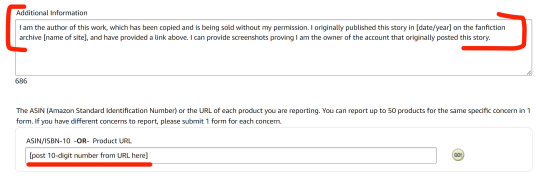
In the ASIN/ISBN-10 field, copy and paste the ID number from the pirated copy's URL. You'll find this ten-digit number in the Amazon URL after the word "product," as in the screenshot below. (If the URL extends beyond this number, you can ignore everything from the question mark on.) Once this number has been added, Amazon will pull the product information automatically and add it to the complaint form, so you can check the listing title and make sure it's correct.
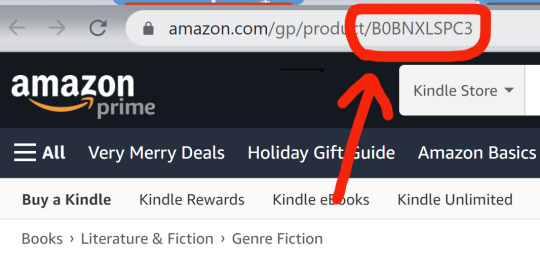
Finally, add your contact information to the relevant fields, check the "I have read and accept the statements" box, and then click Submit. You should receive an email confirmation that Amazon has received the form.
Please share this information with your writer friends, keep an eye out for/report pirated works, and help us keep fanfiction free and legally protected!
NOTE: All of the above also applies to Amazon products featuring stolen artwork, etc., so fan artists should check too!
#fanfiction#ao3#piracy#dmca#pirated fanfic#please signal boost#i'm mad but also laughing that my dmc fanfic is now a 'number one best selling novel' lol#i'm also a traditionally-published author#so this is both hilarious and deeply insulting to me
86K notes
·
View notes
Text
look i dislike the corporate artstyle book cover trend as much as the next person but we cant pretend every book looking the same is something new. if you stepped into a bookstore in 2013 there would be approximately 57 books whose cover art consisted of a girl in a ballgown with her back half-turned to the camera photoshopped into a vaguely fantasy-like landscape. i was 11 years old fighting for my life to find the right maximalistic girl and her single-adjective book title we cannot forget the horrors i went through please be respectful of my experiences
#and after that every book had a logo on it and a title like an x of y and z#and now its minimalism and titles like the hating kiss game#publishing trends are forever....#personal
37K notes
·
View notes
